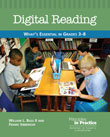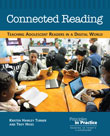
The following post was written by Franki Sibberson and Bill Bass, who will host an #NCTEchat this Sunday, May 17, at 8 p.m. ET.
 For the last eight years, the two of us have been talking, planning, and learning from each other about the role of technology in the literacy classroom. As our book Digital Reading: What’s Essential in Grades 3–8 comes out, we are excited to host NCTE’s upcoming Twitter chat on reading in the digital age. Our commitment to digital literacy is long standing, and we know that our classrooms are different because of technology. We started chatting years ago when we both served on NCTE’s Executive Committee and helped to write the NCTE Framework for 21st Century Curriculum and Assessment, and our conversations have continued as the world continues to change. We look at the issues of digital literacy through different lenses, and we are hoping that our new book helps to bridge the conversation between technology departments and classroom teachers when it comes to literacy in the digital age.
For the last eight years, the two of us have been talking, planning, and learning from each other about the role of technology in the literacy classroom. As our book Digital Reading: What’s Essential in Grades 3–8 comes out, we are excited to host NCTE’s upcoming Twitter chat on reading in the digital age. Our commitment to digital literacy is long standing, and we know that our classrooms are different because of technology. We started chatting years ago when we both served on NCTE’s Executive Committee and helped to write the NCTE Framework for 21st Century Curriculum and Assessment, and our conversations have continued as the world continues to change. We look at the issues of digital literacy through different lenses, and we are hoping that our new book helps to bridge the conversation between technology departments and classroom teachers when it comes to literacy in the digital age.
 Over the years, we have been lucky to work with and learn from so many amazing people. The conversations with Troy Hicks and Kristen Turner as they were writing their book, Connected Reading: Teaching Adolescent Readers in a Digital World (which is part of the same NCTE Principles in Practices imprint as our book), was valuable and helped us shape our thinking as we worked through our writing. One of the things we are grateful for is that we were able to infuse the voices of many classroom teachers into the book. These teachers, listed below, have been instrumental to our own practice, and many will be part of this Sunday’s Twitter chat.
Over the years, we have been lucky to work with and learn from so many amazing people. The conversations with Troy Hicks and Kristen Turner as they were writing their book, Connected Reading: Teaching Adolescent Readers in a Digital World (which is part of the same NCTE Principles in Practices imprint as our book), was valuable and helped us shape our thinking as we worked through our writing. One of the things we are grateful for is that we were able to infuse the voices of many classroom teachers into the book. These teachers, listed below, have been instrumental to our own practice, and many will be part of this Sunday’s Twitter chat.
The questions we’ll explore (see below) are questions we have been asking ourselves over the last several years. We both have strong beliefs about literacy learning, and we know that we have to stay true to those beliefs when we add technology to our workshops. But we also know that things can’t stay the same, because the very definition of literacy has expanded. We hope to see you at the Twitter chat this weekend.
- How has your personal reading life changed as the world has become more digital?
- How do you define digital reading?
- How do you stay true to your beliefs about literacy learning as you incorporate digital tools into your reading workshop?
- How can we create authentic reading experiences for our students?
- How can we give our students opportunities to make meaningful decisions as readers?
- What powerful connections have your students made as readers?
- What resources (people, books, blogs, etc.) have been important for your own professional learning around this topic?
Contributing Authors
- Cryslynn Billingsly (@ccblivelife)
- Maria Caplin (@mariacaplin)
- Ann Marie Corgill (@acorgill)
- Bev Gallagher (@3GallagherPDS)
- Katharine Hale (@katharinehhale)
- Jillian Heise (@heisereads)
- Julie Johnson (@jreaderwriter)
- Scott Jones (@escott818)
- Tony Keefer (@tonykeefer)
- Katherine Sokolowski (@katsok)
- Gretchen Taylor (@GretchenETaylor)
- Karen Terlecky (@karenterlecky)
